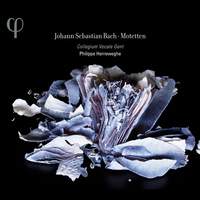Recording of the Week,
Bach Motets from Herreweghe
Thirty years after his first recording of Bach’s motets, conductor and scholar Philippe Herreweghe has decided to re-record these wonderful works. Back in 1981 Herreweghe and his Collegium Vocale Gent were one of the pioneering early music groups, and their recording of these motets typically using two or three voices per part was quite a jump from the more typical large choirs which until then had been more commonly heard.

So what has changed in this new recording? Thirty years is after all quite a long time in the development of early music performance practice and does this new recording therefore present another ground-breaking revolutionary reading?
Well, no, not really. There were so many outstanding features in the first recording that such an approach wasn’t necessary or desirable. It is true that much more is known about the performance of Bach’s sacred vocal works now, and in particular a strong indication that one singer per part was common practice. Common practice maybe but Herreweghe doesn’t believe that was always the case. He takes a much more pragmatic view, and as far as Bach’s motets are concerned believes several approaches are possible and indeed necessary to make this music sound its best.
Therefore on this new recording (again with the Collegium Vocale Gent), for some of the motets he uses just one singer per part (Komm, Jesu, komm; Jesu, meine Freunde; and Lobet den Herrn) while in the others he uses two or three voices per part. Similarly instruments are more heavily used in some motets than others, and in the motets written for two choirs the strings support Coro I and the winds Coro II. In these grander more majestic motets these instruments bring much in terms of colours and dynamics to the music and help considerably to reinforce the meaning of the texts (typically ‘praise the lord’ or similar).
Like in his earlier recording, Herreweghe again uses sopranos rather than boy trebles (Bach would only have had men and boys in his choir at the Thomas-Kirche in Leipzig). These motets are fearsomely difficult to perform and whilst there are recordings of the motets available with boys, the technical difficulty means that I’ve yet to hear one that really convinces like this.
These are terrific performances. The single voices or very small choir produce crystal clear textures, and this transparency combined with fine intonation and excellent ensemble produce a really memorable disc. Tempos are generally slightly faster than on his earlier recording, and the fact that it doesn’t sound difficult is of huge credit to the singers.
There is much to enjoy here and you can get a good flavour of this recording via the sound samples below.
Collegium Vocale Gent, Philippe Herreweghe
Available Formats: MP3, FLAC, Hi-Res FLAC



